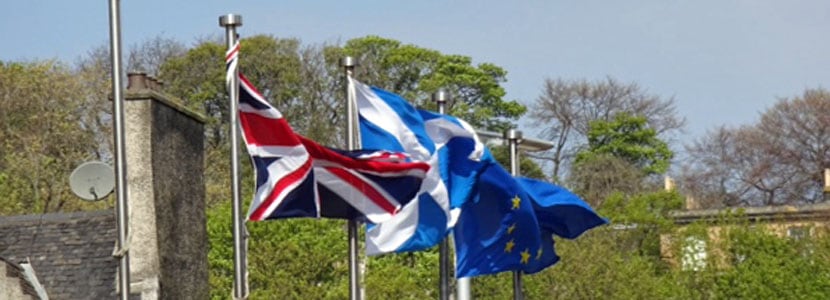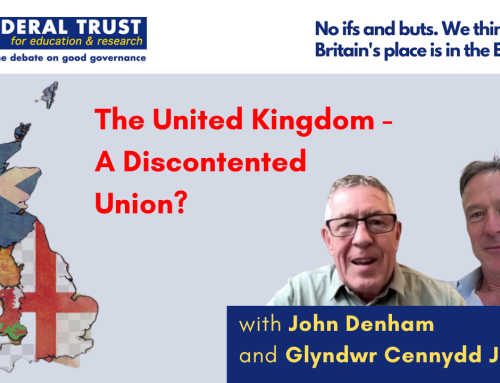
by Dr Kirsty Hughes
Director, Scottish Centre on European Relations
13th May 2020
This article was first published by the Scottish Centre on European Relations
The shift in England to a more substantial easing of lockdown restrictions, while Northern Ireland, Scotland and Wales stick to a slower route and to the ‘stay home’ messaging, has received much attention this week. But is this a significant political division or a storm in a tea cup over differences across the devolved nations?
The UK has one of the world’s worst death rates so far – the jury and data still out on whether the UK is definitively ahead of Italy in Europe. Financial Times data show that the UK not only has a high overall total of excess deaths but remarkably high levels too across different parts of the UK, something it suggests is indicative of a late lockdown. Out of the 12 parts of the UK (9 English regions plus Northern Ireland, Scotland and Wales) only three have excess deaths under 50%. Interestingly, those three are Northern Ireland (with the lowest excess at 34%), Wales (42%) and the South-West of England (38%) – while Scotland’s excess deaths are running at 55% and London’s at a shocking 135%.
It might seem that the overall mis-management of the crisis in the UK, both higher deaths from a late lockdown and halting then late renewed scaling up of ‘test, trace and isolate’, and a likely deeper economic crisis as a result, would be enough to occupy all parts of the UK. After all, the four nations all went into the late lockdown together – and there were, shockingly, no strong political demands for an earlier lockdown. But the failures, and the different outcomes so far, may also point to the benefits of a differentiated response, especially where the UK government does not appear to be learning many lessons from other countries or from its mistakes so far.
Some in Scotland argue that the Scottish government didn’t have the economic powers to underpin an earlier lockdown at the start of March, so any blame for higher deaths and a late lockdown should sit only with the UK government. But a lack of powers didn’t stop the Scottish government arguing for Brexit compromises such as Scotland staying in the EU’s single market or a differentiated migration policy. So there are questions to ask of the devolved governments too.
Equally, two months later, that Northern Ireland, Scotland and Wales are now hesitant to follow England’s lockdown easing is not surprising given how the crisis has unfolded. More differentiation earlier, in the absence of a serious, urgent UK strategy would clearly have been desirable too.
A Fragmented UK
Of course, a London-centric UK media can, periodically, only too easily and excitedly discover there are four nations in the not always very united kingdom. But the UK was diverse and fairly fragmented politically even before the corona crisis. Even with Johnson’s landslide victory last December, only England delivered a majority of Tory MPs – the four parts of the UK looked and look very different politically. And the UK is and remains divided on Brexit too – back in 2016, Scotland and Northern Ireland voted remain to England and Wales’ leave vote. Now, Northern Ireland – if the UK government doesn’t renege on its Withdrawal Agreement with the EU – is set to be effectively in the EU’s single market for goods and de facto its customs union, with a border between Britain and Northern Ireland (progress on which is currently stalled, and with much concern as to what will happen to this commitment in international law if the UK goes, in the midst of the worst economic downturn in centuries, for a no deal Brexit).
Yet there is no doubt that Covid-19 is a major political as well as health, social and economic crisis. How it will play out, though, in the politics of a fragmented UK is an open question.
In Scotland, Nicola Sturgeon’s popularity is substantially ahead of Boris Johnson’s – though both seem to have benefitted from public support for a leader at a time of crisis. And while Johnson has tried this week to play down the fact that Northern Ireland, Scotland and Wales are not following his easing of the lockdown, the Scottish Tories are clearly worried at this development and demanding explanations from the Scottish government as to why it is following the path it is. It’s a fair enough question but scenes from London of crowded buses and tubes may suggest that the answer will not be too hard for Nicola Sturgeon to give.
The Scottish government’s own policy states clearly it is aiming to suppress the corona virus and that test, trace and isolate is central to that, and to a future easing of the lockdown. But progress has been slow in Scotland on increasing testing and tracing capacity – an area where it could have moved ahead early and faster.
The Irish Example
The Irish example is telling. In the week to 12 May, over 44,000 tests were done in Ireland – with over a quarter of a million having been done in total. Ireland’s comprehensive test, trace, isolate was expanded rapidly from 13 March (bringing in 40 army cadets to train as new contact tracers before scaling up to hundreds). Ireland also moved early to a policy of asking those arriving into Ireland, except from Northern Ireland, to self-isolate for 14 days (this does apply to those arriving from Britain too – even though Boris Johnson in his indeterminate plan to introduce quarantine at some point has said it won’t apply in the other direction i.e. for those coming from Ireland to the UK).
Ireland has had 1488 deaths from covid-19 – a worse outcome than in some of the other small EU countries, such as Denmark, Finland and Slovakia but a good outcome compared to its big UK neighbour next door, and to Scotland on 1,973 (on 13 May – though the weekly update figures for Scotland are higher, and excess deaths at 3,710 higher again). There has also been regular communication, in the frame of the Good Friday Agreement, between the Republic and Northern Ireland – whether this relates in any way to Northern Ireland’s lower death rate is one more interesting question to ask.
Where Next?
With a deep economic recession looming and the UK still not out of the first wave of Covid-19 cases and with a potential second wave to come, it’s early days to ask how the crisis might impact on support for Scottish independence or the future prospects for Irish re-unification, or even for the smaller but active independence movement in Wales. But so far, the Covid-19 crisis is creating divisions not healing them. And Brexit has not gone away. Few expect the UK government to ask the EU for an extension to transition by the deadline of the end of June – though it remains an option. But the mishandling of the Brexit talks, and that potential failure to extend transition, will not go down well in Northern Ireland or Scotland, and quite likely not in Wales too.
One recent poll put support for Scottish independence at 50:50. This suggests little change since the start of the Covid crisis. But if Scotland’s path through the crisis, and the easing of lockdown diverges substantially in the coming months, then how that impacts on public opinion and support for the SNP, and for independence, may depend on whether a different path leads to significantly better results or not, and how the economic downturn impacts too. There will also be much to argue about in the comparative data – with Nordic and Irish neighbours of similar population size having done so much better than Scotland in the crisis.
The next elections to the Scottish parliament are one year away. But politics has not gone to sleep in Scotland. Nicola Sturgeon has so far focused, as she said she would, on managing the Covid crisis. And opposition politicians are right, of course, to ask questions on testing, care homes and so forth. But Tory concerns on borders coming to the fore as the paths out of lockdown diverge are highly political – and only too clearly focused on the unionist-independence divide. Meanwhile, the SNP has its own divides to contend with – Alex Salmond’s book on the claimed conspiracy around his trial has yet to come out, and some on his side are already setting out their stall.
Overall, the UK is stumbling through the Covid-19 crisis – with much of Europe and the rest of world looking on aghast (even despite having seen the ideological and extraordinary political chaos and incompetence of the recent Brexit years). The UK’s own internal fractures pre-date the crisis. But the fragmenting approaches to its management across the four nations speak not to a strategic and de-centralised policy but to an ad hoc devolution settlement that is straining under the crisis as the UK government flounders.
How this plays out politically is one key question in the weeks and months to come. For now it looks likely to at least cement if not substantially exacerbate existing divides.






